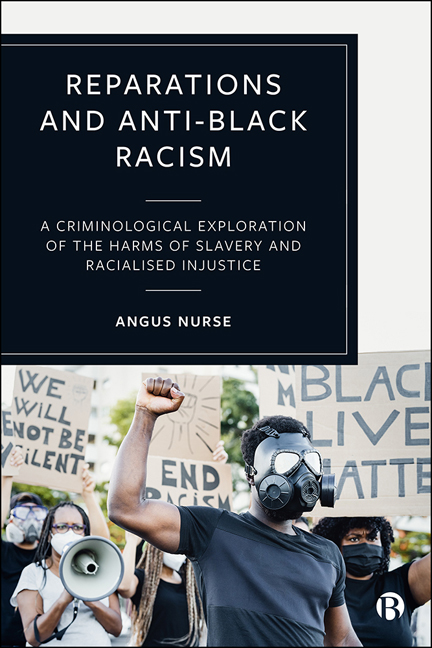 Reparations and Anti-Black Racism
Reparations and Anti-Black Racism Book contents
- Frontmatter
- Contents
- List of Abbreviations
- Acknowledgements
- Preface
- 1 Black Lives Matter: The Legacy of Slavery
- 2 Slavery and Reparations: A Criminological View
- 3 Reparations Litigation: An Overview
- 4 Victims of Slavery and Reparations: Who Suffers?
- 5 A Comparative Analysis of Reparations
- 6 Unjust Enrichment and the Socio-Legal Case for Reparations
- 7 The ‘Value’ of Reparations
- 8 The Nature of Reparations
- 9 Reparations in the 21st Century: Contemporary Debates and Issues on Reparations
- Appendix: Reparations Litigation and Settlements
- Notes
- References
- Index
5 - A Comparative Analysis of Reparations
Published online by Cambridge University Press: 13 May 2022
- Frontmatter
- Contents
- List of Abbreviations
- Acknowledgements
- Preface
- 1 Black Lives Matter: The Legacy of Slavery
- 2 Slavery and Reparations: A Criminological View
- 3 Reparations Litigation: An Overview
- 4 Victims of Slavery and Reparations: Who Suffers?
- 5 A Comparative Analysis of Reparations
- 6 Unjust Enrichment and the Socio-Legal Case for Reparations
- 7 The ‘Value’ of Reparations
- 8 The Nature of Reparations
- 9 Reparations in the 21st Century: Contemporary Debates and Issues on Reparations
- Appendix: Reparations Litigation and Settlements
- Notes
- References
- Index
Summary
The previous chapter identified that reparations have been considered by the US government in cases where the state acknowledged an obligation to pay reparations for harms attributable to government action; namely the harms caused to native Americans and Japanese Americans. In this case, state acceptance of the case for reparations is arguably linked to direct action that harmed citizens and amounted to an infringement of human rights.
This establishes an important consideration in reparations discourse; the notion that where states can tangibly be determined to be culpable for harm to an identifiable group or individuals within a group then reparations may be due at a state level. Such reparations amount to a form of compensation for the harm caused and ‘damages’ owed to the affected group or collection of individuals. This chapter expands on Chapter 4's discussion of this principle via an in-depth case study of another reparations case; restitution for the Holocaust and the losses suffered by Jewish people during World War II. The nature of these reparations is well documented, and a robust legal and administrative process was created to allow for the making of claims, the administration of payments and review of the operation of the scheme. Records exist concerning the nature of reparations owed and of the affected individuals. Reparations were also given to native Americans where the state has accepted the necessity of providing federal aid and redress as a consequence of state exploitation, and to Japanese Americans for internment following the Pearl Harbor attack.
This chapter conducts a comparative case study of Holocaust reparations and anti-Black/slavery reparations noting that while the Holocaust reparations claims were arguably successful, the case for reparations was not without its problems. Securing reparations from Germany for survivors of the Holocaust was arguably an ordeal that for some survivors lasted for decades after the formal end of hostilities. As this chapter shows, not all who were arguably eligible or deserving of reparations were compensated and thus questions could be raised about the extent to which the reparations paid amounted to an adequate remedy for the harm caused. Thus, Holocaust reparations provide for a useful comparison from which to consider how slavery and anti-Black reparations might be pursued.
- Type
- Chapter
- Information
- Reparations and Anti-Black RacismA Criminological Exploration of the Harms of Slavery and Racialised Injustice, pp. 61 - 72Publisher: Bristol University PressPrint publication year: 2021


